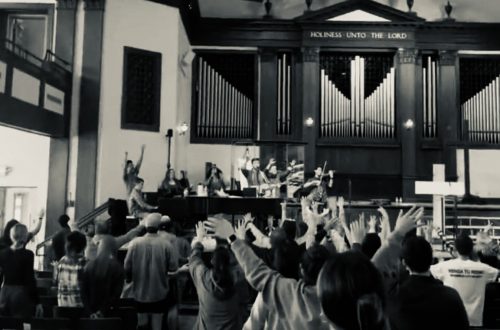 I was just reading Joe Carter’s explainer on the Justice Department’s recent warning to North Carolina concerning their “bathroom law.” (By the way, Carter’s explainers are always excellent and helpful. Don’t miss them.) He shows that the Justice Department’s redefinition of “sex” is unprecedented and actually will do harm to real women. In his conclusion, Carter makes an observation worth noting:
I was just reading Joe Carter’s explainer on the Justice Department’s recent warning to North Carolina concerning their “bathroom law.” (By the way, Carter’s explainers are always excellent and helpful. Don’t miss them.) He shows that the Justice Department’s redefinition of “sex” is unprecedented and actually will do harm to real women. In his conclusion, Carter makes an observation worth noting:
This is why complementarianism is not merely about “submission” within the family. It’s also about protecting women from a culture that worships male power and disdains femininity, and has no qualms about using the LGBTQIA movement to codify advantages for men into the law.
I think Joe is right about this, and there is a smiling providence that we would do well to acknowledge. The complementarian vision was forged in an intra-evangelical conflict over the role of women in ministry. Ultimately, it involved issues of authority and leadership in both the church and the home. In the late 80’s and 90’s when evangelical theologians began to produce a body of work to articulate and defend the complementarian position, no one could have anticipated how important this work would be for the controversies we are now facing.
In short, the complementarian vision is not merely about authority and submission. It certainly is about those things, but it is so much more. It is about what it means to be created as male and female in God’s image. It is about showing that the Bible commends a normative connection between biological sex and gender roles/identity. It is about showing that the diversity of roles and functions between the sexes is a glory to be celebrated not a social construct to be denigrated. In other words, God has used a smaller scale conflict to give us theological resources for the gargantuan conflict that we are facing now. Who could have planned that but God?
As we look to the future, it is important for us to remember that the complementarian position was articulated in opposition to egalitarian views. Because of that, complementarian norms have often been narrowly defined with respect to the church and the home. The Danver’s Statement, for example, is the consensus statement for complementarians, and it applies complementarian principle rather narrowly to the church and to the home. That is why you have had a diversity of opinion among complementarians over the years about the extent to which this view applies outside the church and the home.
Our culture’s recent embrace of transgender and homosexual identities, however, is forcing complementarians to have the conversations that have been heretofore unresolved. Because the complementarian vision is rooted in creational norms, it implicates far more than simply the way Christians behave in the church and the home. If it defines us as male and female in the image of God, then it must have implications for everyone in every sphere of life. Right now, complementarians tend to agree that complementarian norms rule-out transgender and homosexual identities. But what else does the view imply? What does our view teach us about human flourishing and the common good, etc.? These are the questions that complementarians are facing today. Complementarians need to think their way through to biblical clarity and consensus in answering them. That conversation is ongoing.
These are tough questions, but we have all the resources we need to answer them. God has once again given us everything we need for life and godliness (2 Pet. 1:3). Evangelicals are not starting at zero as we face a post-Christian culture in the aftermath of the sexual revolution. We have a case to make and a biblical vision to uphold, and we will meet this challenge in part because we’ve already been working on it for the last thirty years. Thanks be to God.




4 Comments
Jay Miller
Don’t know if this applies exactly, but I remember a few years back a prominent radio psychologist talking to an LGBT mom with some questions. As part of the conversation this mom mentioned how she felt she had missed out on connecting with her father as a child and was now trying to find a way to connect with him as an adult. The radio doctor stopped this woman in mid sentence and asked her if she was hearing herself, and then she challenged the caller to think if she was doing the same thing to her own children by depriving them of the chance to have a relationship with a father. After hearing that conversation on the radio, I have always felt it was a powerful argument for traditional values and roles. i think science still talks about how children move back and forth between mother and father as they grow and mature from childhood into adulthood. So why deprive children of this developmental cycle if you have the choice. Seems like adults get all the choices and kids get none in today’s society.
Ross Shannon
Denny, Mark Dever noted the challenge to “a normative connection between biological sex and gender roles/identity” in his introduction of a sermon I heard at CHBC in 2008. This is the first of four excellent sermons on sexual identity and roles he preached 8 years ago. They are worth a listen…even years out.
http://www.capitolhillbaptist.org/sermon/gender-identity-in-creation/
Christiane Smith
Hi DENNY,
Thank you for clarifying the concept of how evangelicals view complementarianism.
In my Church is said, this: ‘In the “unity of the two”, man and woman are called from the beginning not only to exist “side by side” or “together”, but they are also called to exist mutually “one for the other” ‘ (Mulieris Dignitatum, apostolic letter from John Paul II)
From this view of the natural physical complementarian relationship between a husand and a wife, the emphasis is one based not on ‘subordination’ or ‘submission’, but on ‘love’. That is the largest contrast I can find in how our two traditions view the blessed marriage mutual giving of husband to wife and wife to husband. In the view of my tradition, I don’t think we have the same definition of deeper division between ‘male’ and ‘female’ that is celebrated in the evangelical Southern Baptist tradition. In my own tradition, the terms ‘complementary’ and ‘egalitarian’ are not seen as oppositional.
I suspect there is a range of diversity even within the evangelical community on how the two terms are viewed. The sacred Scriptures do offer many verses that provide for diverse viewpoints, yes.
Pingback: